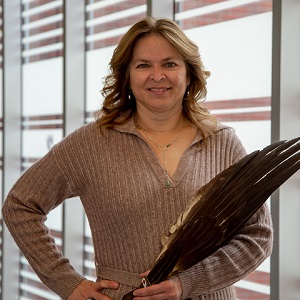
Lisa Spellman, Sicangu Lakota
Communications/Media Specialist – UNMC Department of Strategic Communications
Tribal Community Liaison – Nebraska HEALING
University of Nebraska Medical Center
We caught up with Lisa Spellman to discover more about her, what she’s up to, and what we can learn from her.
Briefly describe your current role.
I have two roles at UNMC. As a communications/media specialist, I write stories for internal publications and promote UNMC to local, regional, and national media. In my role as the tribal community liaison, I work directly with regional tribes to address their needs and connect them with experts at UNMC and in the state.
Briefly describe your career journey and what led you to institutional advancement in academic medicine.
My degree is in journalism, which I pursued for 13 years at the largest newspaper in the state, The World-Herald. My journalism career culminated in a five-day exposé on the failings of the United States to provide meaningful education to American Indians, after which I left the position to join the public relations staff at UNMC. I quickly realized that I was one of a handful of Native American professionals working at the medical center. I became a de facto tribal community liaison for many faculty and leadership at UNMC over the years, helping them navigate cultural norms among the different tribes in the region and work to create relationships with tribal communities. It wasn’t until the summer of 2022 that this de facto position became a part of my job.
What achievement in your current job are you proud of?
I stand on the shoulders of my ancestors. On the shoulders of a father who struggled with historic trauma and the abuse he endured in boarding school along with so many other relatives, who fought to keep our culture alive. The achievements I am most proud of honor them and my children and may not always be earth shattering but are the most meaningful to my community. To that end, I was recently able to fulfill a request from a friend and Umon’hon’ tribal member, who asked if I knew anyone who would be willing to help provide shoes and some clothing to a teenage relative of theirs. I facilitated a delicate conversation between a faculty member and this friend that required much humility, compassion, and understanding, which led to a donation of a pair of shoes, boots, t-shirts, pants, undergarments, and sweatpants—the first new clothes this teen owned in a long time.
What success have you achieved with limited resources?
In 2012, I collaborated with the Ponca Tribe of Nebraska and an ophthalmologist from our former international division to provide no-cost comprehensive vision screenings to patients at their intertribal urban health clinic. The all-volunteer crew also included several medical students and a fellow from the Orbis Flying Eye Hospital, who packed into a small conference room at the health clinic for four days and provided more than 100 people with services. The services were so well-received that the collaboration continued until the ophthalmologist departed UNMC in 2015.
What is a challenge that you/your unit/your institution is facing and how are you addressing it?
Native Americans make up less than two percent of the U.S. population, yet in Nebraska there are four federal recognized tribes who at one point or another access services at UNMC and its clinical partner. However, there are very few Native Americans who work for either institution, something we strive to change. For more than a decade, I have worked alongside faculty who are willing to work in Native communities, or deal with the Indian Health Service and the red tape that entails, to bring resources and services to urban and rural Native communities. Our communities are small and our resources less than limited, and I will continue to do whatever I can to meet the needs of our people and support anyone who is willing to honestly and humbly provide their expertise, experience, and time.
What is the best career advice you were given and how have you used it?
Do one thing at a time, do it well, and grow from there. I believe it takes time to grow great programs, even if that means starting with one person. And I don’t mean just working out the kinks, but investing time, talent, and resources into that one person to help him/her succeed before moving on. The work I do is personal, so I apply this to the people I work with in the Native communities in the state knowing that many of those I encounter are friends and relatives, and I treat each one as such.
What advice do you have for other institutional advancement professionals in academic medicine?
Listen. Listen to those around you, no matter if they have the same level of education or social status as you, because their wisdom might just surpass yours.
We want to shine the light on you! If you want to connect with others, share stories, and highlight best practices by being featured in the Member Spotlight, please contact gia@aamc.org for submission guidelines.